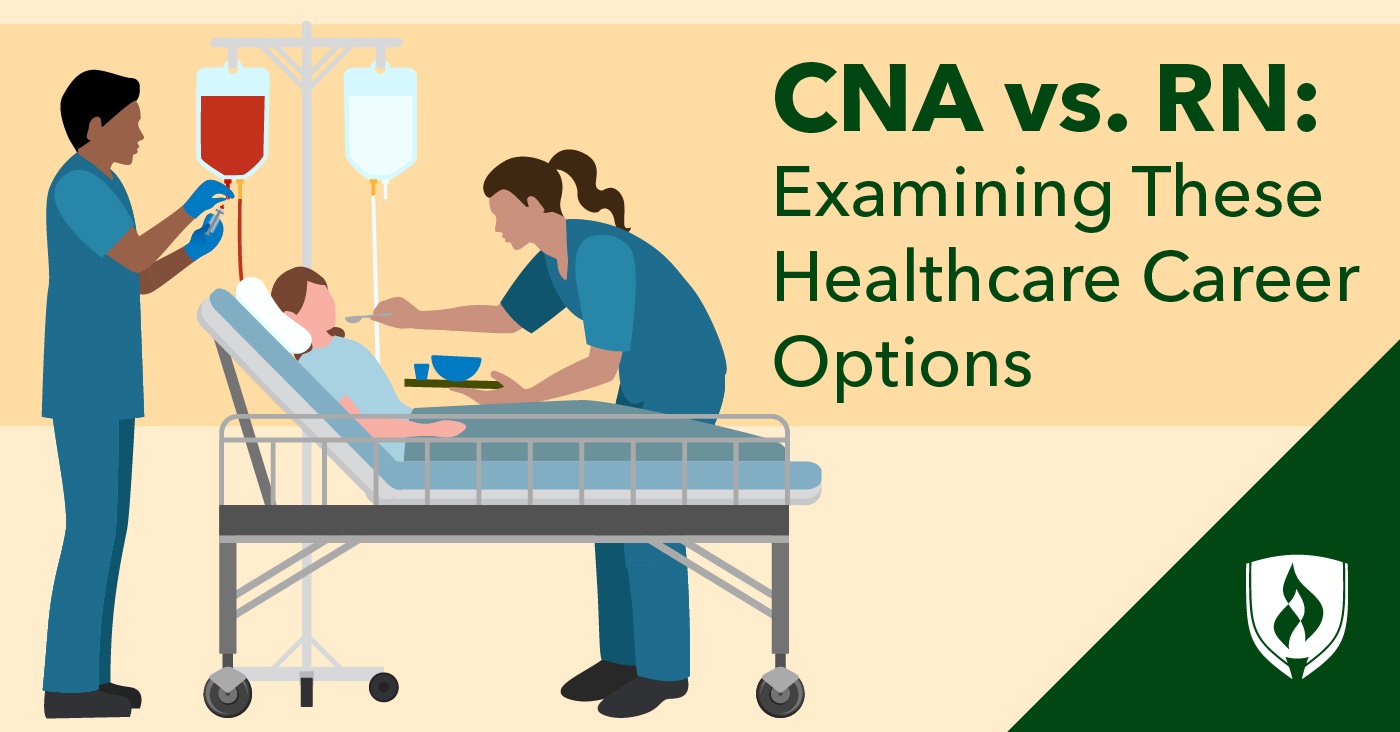
You’ve been imaging what a career in a nursing might look like for you. Though the idea of working as a nurse sounds rewarding, determining your first step into this field can be confusing. There are so many types of nurses, job titles and acronyms in the healthcare field that it can be hard to know exactly where you want to start and which credential you should work towards to make it happen.
To help you with that, we’ve decided to shine a light on the differences between registered nurses (RNs) and certified nursing assistants (CNAs). While these job titles might seem similar, there’s quite a bit that makes them distinct from one another. We’ll compare and contrast education requirements, salaries and job duties to help you see where you might fit best. Read on to get a better understanding of both important healthcare positions.
Get Your Nursing School Questions Answered at a Nursing Information Session
CNA vs RN: The basics
As we get started, keep in mind that while “CNA” refers specifically to certified nursing assistants, in this article, we’re using the term to broadly refer to all nursing assistants and nursing aides. Depending on the state you plan to work in, you can find nursing assistants with many designations, including:
- Certified nursing assistant (CNA)
- Registered nursing assistant (RNA)
- State-tested and -approved nursing assistant (STNA)
- Licensed nursing assistant (LNA)
Though you may find a lot of variety in job titles, keep in mind that job duties will be largely similar but may vary somewhat depending on the healthcare facility.
With that out of the way, let’s take a look at the broad, overall duties of the CNAs and RNs—this is where the distinction between the two roles becomes clearest.
What does a CNA do?
Certified nursing assistants are key parts of any healthcare team, whether in a nursing home, hospital or home healthcare setting. Though they are not true nurses, they assist nurses with patient needs, including taking vital signs, lifting and transporting patients, feeding patients, and assisting with bathing and dressing.1
CNAs often also help serve meals, help patients use the bathroom, and transfer patients between beds and wheelchairs. In some states, depending on the CNAs certification, they can give prescribed medication.
What does an RN do?
Registered nurses are skilled multitaskers who both care for patients and support other healthcare providers. Specific RN duties will vary depending on the healthcare setting and nursing specialty, but no matter the setting, they have a much greater scope of practice and responsibilities than nursing assistants.
Registered nurses can administer medications to patients, monitor them for reactions or side effects, update patient medical records, and create and implement patient care plans.1 They also play a significant role in educating patients and their families on medical care and home treatments. Nurses can work in a variety of medical specialties that expand their duties to include more specialized treatments.
CNA vs RN: Skills needed
Another way to shake out the differences between these roles is to take a look at the skills employers are seeking in job postings. We used job-posting analysis software to examine thousands of CNA and RN job postings. Our findings revealed the most in-demand skills employers are seeking in each field.
In-demand CNA skills:2
- Patient care
- Activities of daily living assistance
- Bathing
- Cardiopulmonary resuscitation (CPR)
- Vital signs management
- Patient assistance
- Patient bathing
- Toileting
- Caregiving
In-demand RN skills:3
- Patient care
- Advanced cardiac life support (ACLS)
- Treatment planning
- Acute care
- Cardiopulmonary resuscitation (CPR)
- Telemetry
- Life support
- Critical care nursing
- Hospital experience
- Patient education and instruction
You’ll notice that the RN list includes more specific and advanced medical skills while CNA skills lean more towards helping patients with day-to-day activities, like going to the toilet and bathing, depending on the setting. Both roles obviously overlap in that they typically involve directly caring for patients, but RNs take on duties that require advanced training and knowledge.
CNA vs. RN: Education and training needed
The differences in skills and duties between RNs and CNAs is reflected in the level of education and training needed for each. In short, the path to becoming a CNA is much shorter than the path to becoming an RN—but you’ll want to look into the details below.
How to become an CNA
One of the most attractive things about this healthcare career option is that you don’t need a college education to apply for a nursing assistant training program. In most states, you will simply need to be 18 years or older, have a high school diploma or GED, and pass a few screenings.
That makes nursing assistant training ideal for high school grads who want to see if healthcare suits them before they invest in undergraduate education. It’s also a good option if you just want to gain some hands-on life experience and build your interpersonal skills.
No matter your motivation, you’ll need to complete a nursing assistant training program, and then you’ll take your state’s CNA (or equivalent) exam. Though the requirements will vary from state to state, it will likely be some combination of written and skills testing.
How to become a RN
On the other hand, becoming an RN takes more education and training. To become a registered nurse, you’ll need to earn either an Associate’s Degree in Nursing (ADN) or a Bachelor’s of Science in Nursing (BSN), pass the NCLEX-RN exam, and meet any other state licensure requirements.
In the end, both the ADN and BSN paths can lead to a career as an RN—your decision simply depends on what’s best for you based on how much time you want to spend in school and what your personal career goals are. For example, those who may be interested in nursing leadership or highly specialized roles may benefit from earning a BSN. With that said, ADN-RNs always have the option of going back to school if they decide further education is in line with their career goals.
CNA vs RN: job outlook
When researching career options, it doesn’t hurt to have an idea of what the job market looks like and how much you could potentially earn. Fortunately, as the healthcare system stretches to accommodate the large and aging baby boomer population, the Bureau of Labor Statistics (BLS) projects that hospitals, clinics and long-term care facilities will rely on additional nurses and nursing aides to help meet growing patient demand.1
Employment of nursing assistants is likely to be on the rise, with a projected eight-percent growth in opportunities from 2019–2029, double the four-percent national average for all occupations.1
Like with CNAs, projected employment growth for RNs appears to be in good shape. The BLS projects a seven-percent growth in employment from 2019–2029 for this position—that’s a projection of approximately 221,900 new jobs!1
Find your path forward into healthcare
There’s a lot to like about working in healthcare, but it’s still important to find the right role for you. Now that you know more about the distinctions between registered nurses and certified nursing assistants, you should have a clearer picture of which role fits your career plan. CNAs have a relatively short training period, and working as one can provide quality experience for anyone who’d like to work directly with patients in a more advanced role—like registered nursing—down the line.
Keep in mind that’s a completely optional step. If you’re ready to get started on the path to becoming a registered nurse as soon as possible, our article “How to Become an RN Fast: 3 Potential Paths to Pursue” will clarify your options.
1Bureau of Labor Statistics, U.S. Department of Labor, Occupational Outlook Handbook, [accessed April, 2021] www.bls.gov/ooh/. Information represents national, averaged data for the occupations listed and includes workers at all levels of education and experience. Employment conditions in your area may vary.
2Burning-Glass.com (analysis of 328,482 nursing assistant job postings, April 1, 2020 – March 31, 2021)
3Burning-Glass.com (analysis of 1,355,804 registered nurse job postings, April 1, 2020 – March 31, 2021)




